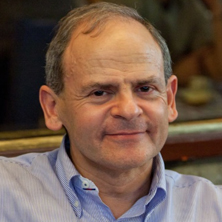
Javier LLorca
Professor
Member of the Academia Europaea
Polytechnic University of Madrid, Spain
Biography: Prof. Javier LLorca is scientific director and founder of the IMDEA Materials Institute, where he leads the research group on Bio/Chemo/Mechanics of Materials, and professor and head of the research group on Advanced Structural Materials and Nanomaterials at the Polytechnic University of Madrid.
A Fulbright scholar, Prof. LLorca is Fellow of the European Mechanics Society and of the Materials Research Society, member of the Academia Europaea and has held visiting positions at Brown University, Indian Institute of Science, China Central South University, Yanshan University and Shanghai Jiao Tong University. He has received the Leonardo Torres Quevedo National Research Award in Engineering, the Research Award from the Spanish Royal Academy of Sciences, the Morris Cohen Award of TMS, the Distinguished Scientist Award of the Structural Materials Division of TMS, the Research Award from the Polytechnic University of Madrid and the Career Award from the Spanish Society of Materials.
His current research interests – within the framework of Integrated Computational Materials Engineering – are aimed at the design of advanced materials for engineering applications in transport, health care (implants) as well as energy (catalysis), so new materials can be designed, tested and optimized in silico before they are actually manufactured in the laboratory.
Invited Lecture: Corrosion and mechanical degradation of additively-manufactured Mg scaffolds for tissue engineering applications
Abstract: Abstract: Temporary implants and scaffolds from bioresorbable Mg alloys, that are progressively degraded and absorbed in the human body and can be manufactured by 3D printing, have tremendous potential for tissue engineering applications. As opposed to permanent implants, that remain as foreign materials in the body after healing and may require second surgeries because of inflammatory reactions, bioresorbable implants disappear and only the natural tissue remains. Moreover, 3D printing technologies allow to design implants and scaffolds that are customized to the patient’s needs.
In this talk, fabrication and optimization of porous scaffolds of WE43 Mg alloy by laser power-bed fusion is presented. It is shown how the scaffold lattice can be tailored to meet different mechanical properties while the biological performance wss improved and corrosion rates were controlled by means of coating deposited by plasma electrolytic oxidation [1]. Moreover, simulation tools were developed to ascertain the mechanical performance on the scaffolds during in vitro tests and validated against mechanical tests after immersion in simulated body fluid [2-3].
[1] M. Li, F. Benn, T. Derra, N. Kroeger, M. Zinser, R. Smeets, J. M. Molina-Aldareguía, A. Kopp, J. LLorca. Microstructure, mechanical properties, corrosion resistance and cytocompatibility of WE43 Mg alloy scaffolds fabricated by laser powder bed fusion for biomedical applications, Materials Science and Engineering C, 119, 111623, 2021.
[2] M. Marvi-Mashhadi, W. Ali, M. Li, C. González, J. LLorca. Simulation of corrosion and mechanical degradation of additively manufactured Mg scaffolds in simulated body fluid. Journal of the Mechanical Behavior of Biomedical Materials, 126, 104881, 2022.
[3] S. Kovacevic, W. Ali, E. Martínez-Pañeda, J. LLorca. Phase-field modeling of pitting and mechanically-assisted corrosion of Mg alloys for biomedical applications. Acta Biomaterialia, 16, 641–658, 2023.


